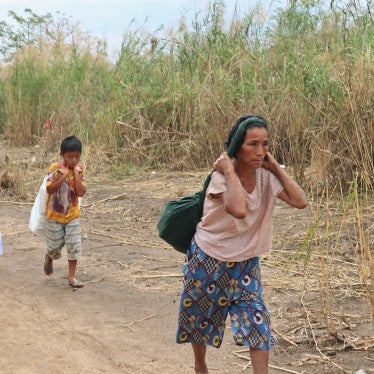Selvamani, a Tamil girl living in eastern Sri Lanka was only 15 when rebel forces began pressuring her to join them. "First they sent letters, then they began visiting my house," she said. "They told my family, `Each house has to turn over one child. If you don't agree, we will take a child anyway.'"
Not long afterwards, in August, 2002, soldiers from the Liberation Tigers of Tamil Eelam (LTTE, or Tamil Tigers) abducted Selvamani while she was walking to class. They took her to a military training camp where she learned to use weapons, including landmines and bombs. During training, when she became too weary to continue and asked to rest, the rebels beat her.
Canadian Tamils don't have to worry that their children will one day vanish on the way home from school and end up in a military training camp.
But the Tamil community in Canada bears some responsibility for the fate of children like Selvamani. Many of Canada's 250,000 Sri Lankan Tamils provide financial and political support for the LTTE, enabling the group to continue its recruitment and use of child soldiers.
The LTTE receives significant funding (often through charitable "fronts") from Sri Lankan Tamils overseas. With the largest Tamil diaspora in the world, Canada is a significant source of such funding. Some experts estimate that Tamils in Canada provide $1 million to $2 million each month to front organizations for the LTTE.
Many Tamil donors may be unaware that their contributions support the recruitment of child soldiers. Although a 2002 ceasefire brought an end to active fighting between the LTTE and the government, the Tigers have continued to recruit thousands of children into their ranks, often by force.
During an investigation earlier this year in eastern Sri Lanka, dozens of children told Human Rights Watch that they had been forced or coerced to join the Tamil Tigers. Like Selvamani, they described rebel soldiers traveling from house to house, threatening Tamil families with violence unless they agreed to provide their sons and daughters for military service. When families refuse, the Tamil Tigers often abduct children from their homes at night, or pick them up from temple festivals or other public places.
Many children are living in fear. Some are too scared to go to school, believing they may be snatched on the way. Others are afraid to leave their homes.
Vanji had already spent several years in the Tamil Tigers and been severely disabled in combat when the Tamil Tigers took her younger brother in July. She went to the local Tamil Tigers camp to beg for his return, saying, ``I gave you years of my life and I gave you my health. Please let me have my brother back.''
Not only did the Tamil Tigers refuse to return her brother, Vanji said, but they also threatened to shoot her if she reported the case. The rebels also told her that she had to rejoin their forces. She asked, ``Is this how they thank me for all the time I gave them? Why are they doing this to me?''
At least 3,500 children have been recruited by the Tamil Tigers since the start of the ceasefire in February, 2002, according to cases documented by UNICEF. The U.N. agency states that this number is only a portion of the true total, as many families may be unable or too afraid to register their case.
International law prohibits the recruitment of children under the age of 18 by non-state armed groups, and their participation in an armed conflict. The recruitment — whether voluntarily or forced — and use of children under the age of 15 is now considered a war crime.
The Tigers deny that they recruit children by force, and instead claim that any children in their forces have joined because of poverty, lack of educational opportunities, or because they are orphaned and have no one to care for them. Although some children do join for these reasons or because they want to fight for an independent Tamil state in Sri Lanka, such ``voluntary'' recruitment is also a violation of international law.
Many Tamils in Canada fled the war in Sri Lanka and are now able to raise their families in safety. But they still have a responsibility to the children and families left behind. They should actively question the LTTE on its recruitment of children. They should urge the LTTE to publicly inform families throughout the north and east of its commitment not to recruit children, and to create a high-level task force to resolve outstanding cases of under-age recruitment. Most importantly, the Tamil community should withhold any financial support for the LTTE or organizations providing it with support until UNICEF verifies that all child recruitment and other serious human rights violations have stopped.
Jo Becker is Advocacy Director for Human Rights Watch's Children's Rights Division.







